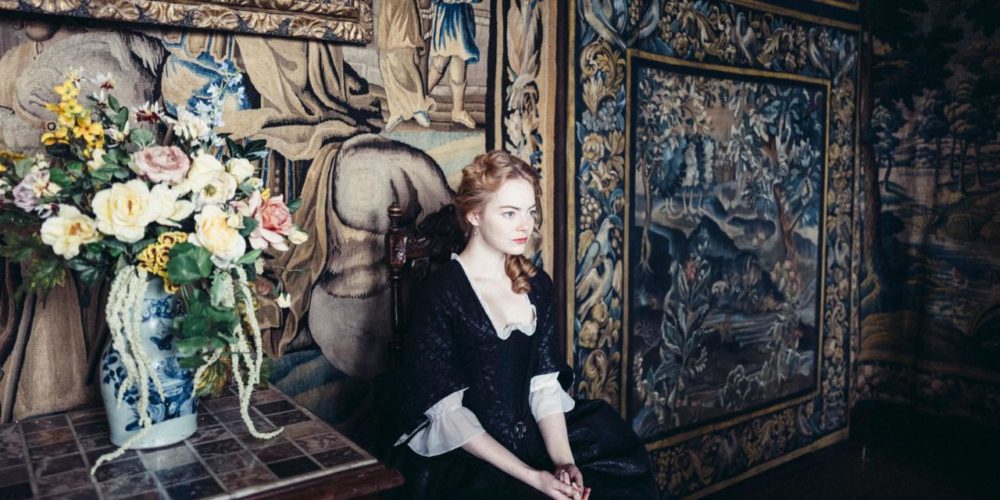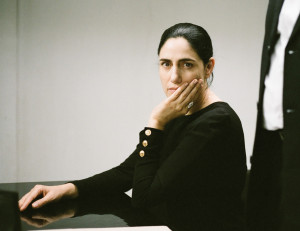
Queen Anne (Olivia Colman) gets lost in the palace. Gout-ridden and confined to a wheelchair, Her Majesty must rely on Lady Sarah Churchill, the Duchess of Marlborough (Rachel Weisz)–and later, the Lady’s cousin Abigail Hill (Emma Stone)–for mobility. Out of her bedroom and without her Favourite by her side, Anne panics, completely unable to find her way back to bed. In The Favourite, Yorgos Lanthimos’ camera flies down hallways with its royal subjects, but never rounds a corner, effectively obscuring the palace’s geography. The resulting mental map is one of a series of beautiful hallways and austere bedrooms unconnected and strung about willy-nilly. I couldn’t tell you where anything is in relation to the Queen’s bedchamber and neither could she, except, perhaps, for Sarah’s chambers.
Lady Sarah has a direct line to the Queen, emotionally and geographically. Fitting that their rooms are the most obviously connected, as the passages between them are the most heavily traversed. Sarah comes to the Queen publicly and in secret at all hours of the day, mixing business and pleasure as if the two were never discrete. The Duchess is using the Queen, manipulating her to continue their war against France, doubling taxes to support it while reaping the benefits of their personal relationship, like the palace Anne gifts her at the beginning of the film. But, in stark contrast to the relationship that develops between Abigail and the Queen, this is not pure opportunism on Sarah’s part. Her cold demeanor and refusal to coddle Anne, who Olivia Colman wonderfully plays like a giant toddler, betrays genuine concern and love.
Abigail, meanwhile, is all overbearing sweetness, void of the obvious cruelty she showcases when Anne isn’t around. While Sarah and Anne’s courtship takes the form of a mutually beneficial arrangement that the film picks up on in progress, Abigail’s pursuance of the Queen is the film’s narrative thrust, a plot formed and carried out in front of our eyes.
Penniless and covered in shit, Abigail arrives at court seeking a job from her cousin, who deigns to put her to work with the rest of the maids. Quickly rising in station to become Sarah’s personal maid and attracting the attention of a Baronet, Samuel Masham (Joe Alwyn, the subject of half the last Taylor Swift album), she discovers that the way to the Queen’s favoritism is through her bed. One night, while reading in Sarah’s bedchamber, she witnesses the Duchess and the Queen have sex. Through her face, we can see her mind at work processing the sight. Her eyes dart back and forth in bemused embarrassment, Emma Stone’s ever-so-wide eyes heavy lifting like they’ve never heavy lifted before. There’s amusement, wonder and a dawning deviance in her flabbergasted, toothy smile, as the plot to replace Sarah as the Queen’s favourite (and reclaim her taken Ladyship) begins to form. I confess I’ve never been an Emma Stone fan (or I’ve never cared for her movies, at least) but at this moment I felt deep appreciation. One of the most expressive faces in Hollywood is here finally put to worthy use.
And so we’re off as one woman’s opportunism sets in motion a nearly deadly love triangle that may decide the course of the War of Spanish Succession. To get all that she wants, Abigail will partner with Harley (Nicholas Hoult), the leader of the opposition in Parliament and an opponent of continued warfare and taxation. Her showdown with her cousin takes on political ramifications, purely as a result of their setting.
Did I mention this is hilarious? The whole film is characterized by quick japes, duck races, and anachronistic dancing that might step too far in the direction of the ridiculous, but never fails to be fun. Weisz and Colman are especially funny. Every word out of the former’s mouth seems barbed and delivered from ten feet above her verbal opponents, even if both of the other principles are roughly her same height. Colman, by the end of the film, is speaking with just half her mouth but still chews on every word of acerbic wit or self-pity spoken. While it’s easy, in description, to make the proceedings of the film sound like the stuff of a thriller, it’s much closer to something Armando Iannucci might deliver, though presented in a much more hysterical register. Thus The Favourite scans as quite a departure from Lanthimos. His films have never been humorless (even if none of the “jokes” in Sacred Deer are funny) but they are always disaffected in tone, with line readings rarely straying from flat. None could ever be described as a romp, yet there’s hardly a better word for what this is.
But the arch seriousness with which Lanthimos approaches the material written by Deborah Davis and Tony McNamara is well within his wheelhouse. The Favourite is broken up into chapters, an unnecessary pretension that only makes the film feel 30 minutes longer, and made with technique that often calls attention to itself. While the director will often employ a stunning dissolve, especially in the first section of the movie and then again in its spectacular final image, too often do the many, many dissolves (God, so many) feel like distracting grabs at a serious-minded aesthetic.
Yet, some of the work is just undeniable and, compared to his last two films, The Favourite’s form is both more playful and substantive. Perhaps it’s just the perceived strangeness of some of the film’s non-rectangular lenses which sometimes serve to make the space claustrophobic and occasionally give the feel of surveillance footage, but throughout there is a tension between intrusively contemporary filmmaking and period setting. This is of a piece with the Sandy Powell-designed wardrobe. All the clothing is accurate to the period’s style but not to its fabrics, which are all modern. While this means everything Rachel Weisz wears in this movie looks incredibly stylish, it also works with Lanthimos’ form to give the impression that this is all simply dress-up. It’s a different sort of distance than the filmmaker usually employs with his subjects, one that doesn’t so much alienate an audience as it does emphasize the performance itself. The palace is thus recontextualized as a stage upon which Sarah, Abigail, and Anne all act. The roles they play–as Queen and her confidants– elevate their personal struggles, imbuing them with consequences for the almost totally unseen outside world.
—
Directed by Yorgos Lanthimos; written by Deborah Davis and Tony McNamara; starring Olivia Colman, Emma Stone, Rachel Weisz, Nicholas Hoult, and Joe Alwyn; 120 minutes.



 Derek
Derek
 Isabelle
Isabelle